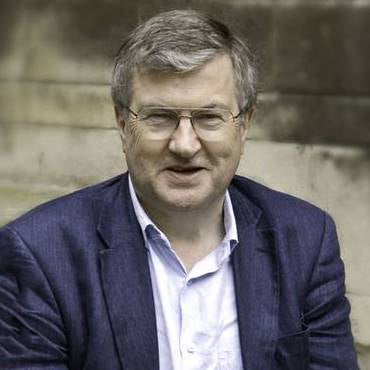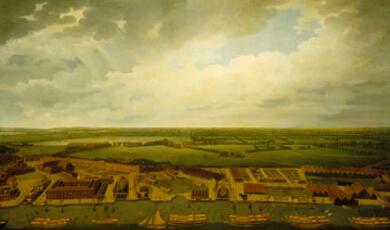Politics and the First World War
Share
- Details
- Text
- Audio
- Downloads
- Extra Reading
The First World War put unprecedented strains on the economic, social and political systems of all the combatant nations. A year after the war ended, the Great European Empires had collapsed, and new, extremist ideologies, from fascism to communism, had emerged to disturb the postwar political world.
This lecture explores the reasons for the radical political changes that made the First World War the seminal catastrophe of twentieth-century Europe.
Download Text
17 March 2015
Politics and the First World War
Professor Sir Richard Evans FBA
‘War’, as the great Prussian military theorist Carl von Clausewitz famously observed, ‘is the continuation of politics by other means’. It was in his view an instrument of policy, to be used to achieve specific aims and purposes. A perfect example of how this dictum worked out in practice could be found in Bismarck’s wars of the 1860s, all designed to achieve German unification under Prussian leadership. In each case, Bismarck provided a retrospective illustration of another famous dictum, this time from a French politician Georges Clemenceau, during the First World War, that ‘war is too important a matter to be left to the generals’. After the rapid victory of the Prussian armies over their Austrian opponents at the Battle of Königgrätz in 1866, the generals were keen to push on to Vienna, but in a series of heated arguments Bismarck stopped them, convincing the Prussian King, Wilhelm I, that the aim of expelling Austria from the German Confederation had been achieved, and that it was unnecessary to go any further, indeed dangerous, since the new Germany did not want to make an enemy out of the Austrians; having the French as an enemy was bad enough.
In his relationship with Bismarck, Wilhelm I always gave in to his Chancellor’s tantrums and threats of resignation. As he once said, ‘It’s hard to be Kaiser under Bismarck’. But his grandson, the headstrong Wilhelm II, who succeeded in 1888, had other ideas. Within two years he had got rid of Bismarck and embarked on a course of his own, building a big navy designed to challenge the British in the North Sea and open the way to the enlargement of Germany’s rather miserable little colonial empire. Unlike Bismarck, who coined the phrase ‘politics is the art of the possible’, and said that the art of statesmanship was to ‘steer a course on the stream of time’, the Kaiser had little idea of how precarious the new Germany’s position in the world was, or how dangerous it would be to upset the European status quo without a clear reason for doing so and a rational strategy for putting his policy into operation. Just over a quarter of a century after his accession to the throne, Britain and Germany were at war.
Clausewitz also observed that policy objectives often became obscured in what he called the fog of war. Armed conflict tended to develop its own logic, military events frequently took an unexpected turn, and it required a strong hand to keep the generals under control. Already in his own time the French Revolutionary and Napoleonic Wars had demonstrated the power of ideology to inspire the lust for conquest. But after Waterloo, so great was the general fear in Europe of revolutionary wars breaking out again, that right through the nineteenth century the major powers got together time and again in what became known as the Concert of Europe to solve international problems and put the lid on popular revolutions. In the eighteenth century, Europe’s wars had been global in scale, with Anglo-French rivalry fought out in India and America as well as on the European Continent. After 1815, by contrast, Britain’s world hegemony, underpinned by the unchallenged power of the Royal Navy, helped ensure that European conflicts remained limited in scope. As a result, all the armed conflicts Europe experienced between 1815 and 1914 were short in duration, involved only a handful of combatant nations, and were fought within a very restricted geographical compass: the Russo-Turkish Wars of the 1820s and 1870s, the suppression of the 1848 Revolutions, the Crimean War, the wars of Italian and German unification, all these were eventually brought to an end either by concerted international action or because the victorious side had achieved its objectives.
The states that fought these wars were, obviously, prompted to reform themselves to improve their effectiveness, as in Russia after the Crimean War, and nineteenth-century wars often brought about regime change, as in the unification of Italy and Germany, or the creation of the Third Republic in France after the defeat of the Second Empire by the Germans in 1871, but beneath these changes there was a huge amount of continuity, as the central political institutions of one regime – the electoral system in France, for example, or the hegemony of Prussian institutional structures, or the absolutist power of the Tsar – were carried across into the next.
The war that broke out in 1914 clearly broke with this long-established pattern. It lasted for over four years, it was fought not just in a limited area of Europe but in numerous locations right across the globe, and it defied all attempts to limit it or bring it to an end until one side finally conceded defeat. War had not only escaped the control of politics, it began very quickly to exert its own momentum until its actual effects on politics were profound, even cataclysmic. Four great empires collapsed and were replaced by radically different political regimes: the Ottoman Empire, the Russian Empire, the German Empire and the Austro-Hungarian Empire. It was ‘The Great War’, unprecedented in scale and scope.
So why did the European order of the nineteenth century break down and give way to four years of unrestrained global conflict involving almost every nation on the European Continent? Because this is the centenary year of the outbreak of the conflict, some historians have been pointing to possible parallels between then and now. Then, they say, a rising power, Germany, challenged a declining empire, Britain; now it is China challenging America. Then as now nationalism was on the rise. Then as now border disputes threatened to escalate into wider conflicts, whether in the present day between China and Japan over disputed islands, or in the Middle East, or a century ago, in Morocco or, fatally, in the Balkans. But these parallels, I think, are specious. The main reason for this lies in the sharp contrast in the international order between 1914 and 2014.
Shortly after the beginning of the twentieth century the Concert of Europe began to break down. The rising power of Germany refused to play by the rules, and threw its weight about in the search for colonies – what Wilhelm II and his Chancellor Bernhard von Bülow called Weltpolitik or world policy, the search for a ‘place in the sun’ for Imperial Germany. A naval arms race with Britain ensued; nothing like it had happened before. In 1905 Tsarist Russia was humiliatingly defeated in a war with Japan and turned its attention back to the European theatre. Austria-Hungary was becoming ever more nervous with the rise of Balkan and Slav nationalism within its borders. The French were thirsting for revenge for the defeat of 1871. These powers all sought alliances in order to strengthen their respective positions. Soon Europe was divided into two armed camps, the Triple Alliance of Austria-Hungary, Germany and Italy, and the Triple Entente of Britain, France and Russia.
This was in some ways parallel to the situation in Europe between 1947 and 1989, when two armed camps faced each other in the Cold War. Yet in 1914 Europeans had what seemed to us to be an irresponsibly positive attitude to war: after decades of peace, would be an adventure, it was like a duel fought to assert manliness and honour, only on a much bigger scale. Social Darwinism added to the mixture as politicians and statesmen increasingly saw international relations in terms of the survival of the fittest nation in the competition for supremacy. The Second World War discredited such ideas, however, while the coming of the atom bomb made politicians and peoples far more cautious about launching major armed conflicts.
Since 1989 we have moved from a bipolar world through a brief unipolar world in the nineties into what is now becoming an increasingly multipolar world, reversing the developments that characterized the years before 1914, when Europe moved from the unipolar world dominated by Britain to a multipolar situation and finally a bipolar world divided between the two European alliance systems. While local conflict can trigger a much wider one when you have a bipolar system of alliances, this is much less likely when there are several different players in the power game of international politics. Finally, of course, the international co-operation that faded away with the demise of the Concert of Europe before 1914 revived after 1945 and is still in existence today, in a plethora of institutions of international co-operation from the United Nations to the European Union. Conflict resolution mechanisms exist at many levels. Communications are easier and more intensive. Alliance systems such as NATO or ASEAN do not confront any parallel armed camps on the other side; unlike the situation in the Cold War, neither Russia nor China is part of a global or even a regional military alliance.
The biggest difference between then and now, however, lies in the fact that the First World War was not a war between European states; it was a war between global empires. The ‘Scramble for Africa’ that began in the 1880s and extended to other parts of the world, notably the Pacific, took some time to convert the territories carved out by drawing lines on the map into real colonies. In Africa the Ashanti Wars lasted until the end of the century, the Boers were only subjugated in 1902, the Germans established control in East and West Africa in genocidal wars against the indigenous inhabitants only in 1907, the Belgians established their cruel and sadistic rule over the Congo around the same time, the Russians were still constructing the Trans-Siberian Railway to develop their recently conquered territories in Central and East Asia, and the European powers came to the realization that they would not be able to conquer China only during the Boxer Rebellion in 1900. The colonial map of the world was only completed therefore in the early twentieth century; from this point onwards it was clear that new colonies could only be acquired by seizing them from other powers.
Chief among these was the crumbling Ottoman Empire, which still controlled most of the Balkans, the Middle East and North Africa. The fuse that detonated the explosion of August 1914 was laid by the Italian invasion and annexation of the Ottoman province of Libya and the Dodecanese Islands off the Anatolian coast three years before, in a renewal of the Italian attempt to build a new Roman Empire in the Mediterranean that had come so disastrously unstuck with the annihilation of an invading Italian army by the Ethiopian Emperor Menelik II, armed with French and Russian guns and trained by Russian advisers, in 1896. The Italians’ success in Libya convinced the emerging Balkan nations that the time had come for them to achieve independence. In the two Balkan Wars of 1912-13 they first seized most of the Balkans from the Turks, leaving them only a tiny piece of territory west of Istanbul, then fought each other over the spoils.
In the First Balkan War, when Montenegro in alliance with Serbia attacked northern Albania, Italy and Austria-Hungary demanded their withdrawal, Russia began to mobilize in support of the Serbs, and France declared its support for the Russians. The situation was only defused by a British intervention resulting in a general international conference that guaranteed independence for Albania. The whole episode was an ominous foretaste of what was to happen in August 1914.
In the intervening period the attention of Serb nationalists turned to Bosnia, with its substantial population of ethnic Serbs; in 1908 it had been incorporated into the Habsburg Monarchy, in a unilateral act of annexation that aroused fierce passions among Serbian nationalists. One particular group, the so-called Black Hand, a terrorist movement that had committed numerous atrocities during the Balkan Wars, took the opportunity to express this outrage by sponsoring the assassination of the heir to the Austro-Hungarian throne, the Archduke Franz Ferdinand, on 28 June 1914 as he and his wife visited Sarajevo.
The Austrians were determined on invading Serbia from the start, desperately worried about the stability of their rule over the South Slavs unless they ‘taught the Serbs a lesson’. But the sense of weakness that fuelled their aggression also made them aware that it would be unwise to do this unless they had backing from Berlin. The German government, lacking other major allies in Europe apart from the fickle and unreliable Italians, agreed at a meeting held on 6th July to issue the famous ‘blank cheque’ to the Austrians promising unconditional support. However, nobody at the meeting thought the Russians would intervene. They were not ready; they would surely wait till they were, in 1917. The Russians had backed down in in the major Balkan crisis that had brought Europe to the brink of war the year before. And the Russians would not back a regicide. There is no evidence for the claim that the Germans were using the crisis as an excuse for war with the Russians, still less with the French.
It was not until late July that the European powers began to be aware of the danger of the conflict in the Balkans escalating.On 21 July Bethmann Hollweg, the German chancellor, told his ambassadors: “We urgently desire a localisation of the conflict”. Even the army chief von Moltke thought that Austria could beat the Serbs quickly then ‘make peace quickly’ (13th July). But the Austrians did not act quickly, which was the main condition for localization. It was not until 23rd July that the Austrian government, having taken weeks to secure the required agreement of its Hungarian counterpart, issued an ultimatum to the Serbs to find and punish the assassins. The Serbs indicated their willingness to give in on almost all its points. When on 27th July the Kaiser learned of the Serb response to the ultimatum he wrote: “This does away with any need for war”. In fact of course the ultimatum was an excuse for war, designed to be unacceptable. Even a slight equivocation in the response would be taken in Vienna as a no, which indeed it was.
British opinion was initially pro-Austrian, blaming the Serbs and saying they had to arrest the perpetrators of the murder. Prime Minister Asquith, preoccupied with Ulster, still thought the UK would not be involved as late as 24th July. The press agreed: it would be ridiculous to get involved in this obscure quarrel. Meanwhile, a long-planned French official visit to Russia was in progress. While the French pressed the Russians to stand firm behind Serbia, the Montenegrin princesses married to two key Grand Dukes in Nicholas II’s entourage told them: ‘You’re going to get back Alsace-Lorraine…Germany will be destroyed’. The French government clearly saw its opportunity to get revenge for 1871. On 23rd July Russia and France agreed to defend Serbia. But this failed in its aim of stopping the Austrians from pressing on. They had no alternative strategy.
The ultimatum expired on 25th July. Austria mobilized on 28th (Serbia had already mobilized). Russian leaders were keen to sublimate mounting discontent and terrorism at home into a patriotic crusade abroad. When Russia started partial mobilization on 29th the German leadership panicked. The German Schlieffen Plan, designed to eliminate France before turning to Russia, which was notoriously slow to mobilize, swung into action and shortly afterwards the German army marched into Belgium with the intention of encircling Paris from the west.
The French and the Russians had told Grey that a clear British declaration of support would deter the Germans. But the British cabinet would not allow this. At a meeting on 27th July, three quarters of cabinet ministers opposed entering a war unless Britain was directly attacked. Only on 2nd August did Grey persuade the cabinet that invasion of France and violation of Belgium neutrality would be a casus belli. In the cabinet the threat of Grey and Asquith resigning was crucial. At a time when civil war was threatening in Ireland, and strikes and suffragette outrages were mounting at home, the break-up of the government could not be contemplated.
The reasoning behind the British decision to go to war can’t be reduced to a simple response to German aggression. The naval arms race was no longer an issue by 1914; it had been won decisively by the British with the construction of the Dreadnought class of battleships, which was a major reason why the German government switched funding to the expansion of the land army in 1913. To British politicians and civil servants the threat was not a German challenge to the British Empire, still less to western democratic values, but to Britain’s position in Europe and beyond that, the world. On 25th July Sir Eyre Crowe, a senior Foreign Office mandarin, advised: ‘Should the war come, and England stand aside, one of two things must happen. (1) Either Germany and Austria win, crush France, and humiliate Russia. What will be the position of a friendless England? (b) Or France and Russia win. What would then be their attitude towards England? What about India and the Mediterranean?’ The war was fought as much to tame Russia as well as oppose Germany.
What strikes one about this chain of events is how none of the powers involved was actively working for a general war of conquest and aggrandisement. Even the Austrians, the most belligerent of the European states in the crisis, acted on the assumption that they would be left alone to conquer the Serbs. They and the Germans assumed the Russians would not intervene; the Germans assumed the British would not intervene.Yet efforts to localise the conflict were half-hearted, and by the time it became clear that decisive mediation was needed, events had gone too far. Muddle and confusion reigned. And as the politicians dithered and squabbled, the military took over, pushing for mobilization in the belief that their moment had come. So the First World War wasn’t politics continued by other means; not one single state in Europe began it with clearly formulated war aims or had any unified vision of how it should end.
Once it had started, however, the belligerent nations quickly began to decide what they wanted from the conflict. The most famous set of war aims was of course the German September programme, discovered in the German archives after the Second World War by the German historian Fritz Fischer, with whom I studied some time afterwards in Hamburg. It constituted, as he said, a ‘bid for world power’, with its demands for huge territorial annexations in Europe and overseas. But it never became official policy. As Fischer showed, war aims were constantly debated and disputed in Germany, with hard-line annexationists clashing with those who wanted only limited gains or indeed no annexations at all. The Kaiser’s Germany was not a dictatorship; any government required the assent of the elected national legislature, the Reichstag, for its policies, and the largest party was the Social Democratic Party, which wanted a peace without annexations.
For the Social Democrats, this was a defensive war, waged against the threat of the Tsarist Russian dictatorship, a regime which they saw as backward and barbarous, anti-Semitic and anti-democratic. That is why they voted for war credits in the Reichstag in August 1914. They were also heavily critical of the German colonial empire, as was the second larges party, the Catholic Centre. After the failed 1905 Revolution, the Tsar’s government had restored the traditional despotism by force, establishing a police state, massacring Jews with the aid of the paramilitary ‘Black Hundreds’, suppressing free speech, arresting or exiling revolutionaries and restricting stage by stage the rights and the electoral basis of the national legislature, the Duma, a creation of the Revolution it had never been fully willing to accept.
Russia, along with France, was Britain’s principal ally in the war, a fact that gives the lie to claims that the war was fought from the beginning in defence of western values and democratic freedoms. Not only was Germany a good deal more democratic and free than Russia, but in Britain itself the restricted franchise meant that fully 40 per cent of adult males, including most probably a majority of the soldiers who fought in the British Army, did not have the right to vote. What the men believed they were fighting for, as their letters from the front suggest, was Britain and the British Empire. And indeed the Great War was a global war. 630,000 Canadian troops enlisted; 412,000 Australians; 1,450.000 Indians; 128,000 New Zealanders; 136,000 South Africans. Many of them fought on the Western Front, but 160,000 British colonial troops with one million bearers fought the Germans in East Africa, the vast majority of Indian troops fought the Ottomans in Mesopotamia (150,000 were still deployed on the Western Front). The French deployed large numbers of African troops in Europe, including 172,800 soldiers from Algeria, 134,300 from West Africa, 60,000 from Tunisia, 44,000 from Indochina, 37,300 from Morocco, 34,400 from Madagascar and 2,100 from the Somali Coast.
The European Empires also mobilized vast numbers of colonial subjects as civilian war workers. 31,000 civilian war workers came to Britain from South Africa, 8,000 from the West Indies, 92,000 from China and 82,000 from Egypt. France recruited 76,000 workers from Algeria, 49,000 from Indochina, 35,000 from Morocco, 19,000 from Tunisia, 6,000 from Madagascar as well as 37,000 from China. The Russians of course deployed large numbers of troops from their Asian provinces. The Germans on the other hand lost almost all their colonies immediately. French, British and colonial forces conquered Namibia, Cameroon and other German territories in Africa, except for Tanganyika, where a German force held out for much longer in the campaigns described in William Boyd’s novel An Ice-Cream War. It’s often forgotten that Japan was an ally of Britain in the Great War and joined in the siege of Tsingtao, the German treaty port in China, now mainly known across the world as the site of the Tsingtao brewery, which produces a lager originally known before the First World War by the name of ‘Germania’. Japanese and Australian forces co-operated in the capture of the German colony of Kaiser Wilhelm’s Land, in north-eastern New Guinea and the islands known as the Bismarck Archipelago. For the Japanese the war was an opportunity to test once more their military efficiency against European armies, an aim they achieved sufficiently well to instil a belief in them that they could do the same thing on a much larger scale in the future. Virtually the only part of the globe not involved in the conflict were the Americas.
That changed, of course on 6th April 1917 when the United States entered the war on the Allied side. The main reasons behind the USA’s abandonment of neutrality were the German declaration of unrestricted submarine warfare on 9th January and the interception and publication of the Zimmermann telegram, offering a military alliance to Mexico and help in reconquering Texas and the south-western states. US President Woodrow Wilson felt able to declare war because the February Revolution in Russia had toppled Tsarist despotism and ushered in what looked likely to be a new democratic political system. These events transformed the politics of the war by enabling the Allies to declare it as a struggle for democratic values and a fight to build a better world. Less than a year later, in January 1918, Wilson’s Fourteen Points proclaimed the freedom of the seas, international co-operation, open diplomacy, the autonomy of the constituent nations of the Habsburg Empire, the creation of a new Polish state, and the establishment of a League of Nations, to be major war aims in what was now presented as a moral as well as a military struggle.
In fact, however, these events also have to be seen as part of a wider crisis in the conduct of the war. The immense military, economic and administrative strains placed on the combatant nations had reached breaking-point towards the end of 1916. The war required more vigorous and more determined leadership if the stalemate on the Western Front was to be broken. Not only was the military situation difficult, the morale of civilians was suffering too, especially in Germany and Austria-Hungary, where the Allied blockade was producing serious malnutrition and major food riots. In August 1916 Paul von Hindenburg took over as Chief of the German General Staff, largely acting as a popular figurehead while the actual direction of the war was taken over by the new Quartermaster-General, Erich Ludendorff. New efforts were made to centralise and boost war production with the Hindenburg Programme, while it was largely Ludendorff who pushed forward the policy of unrestricted submarine warfare. The Kaiser and the civilian government were effectively sidelined by the new military leadership. At the same time, however, the Social Democratic opposition split into moderate and radical factions, while the Catholic Centre Party and the liberals formed a joint parliamentary committee to push for political and electoral reform. In the spring of 1917 the Kaiser issued his Easter Proclamation, at the prompting of Ludendorff, promising the introduction of universal and equal suffrage in Prussia, by far the largest constituent state of the German Empire. So political reform was being driven by military necessity.
The February Revolution in Russia aimed on similar lines to increase military performance and boost domestic production of arms and ammunition by securing a greater commitment to the war on the part of the masses. In Austria-Hungary the death of the aged Emperor Franz Joseph in November 1916 brought his grandson Karl VI to the throne, a man whose desperate attempts to save his Empire by negotiating a separate peace with France brought an effective German takeover, alienating the population of the Empire and hastening its disintegration. In Britain, Asquith gave way in December 1916 to the far tougher and more determined figure of Lloyd George. In 1917 the leadership of the French war effort was taken over by Georges Clemenceau. Within a few months, therefore, the political situation was transformed, the more so in the winter of 1917-18, when the Bolshevik Revolution pulled Russia out of the war.
By this stage, despite Woodrow Wilson’s idealism, winning the war had become an end in itself. Military necessity trumped politics. In Russia the Bolsheviks were determined to end the war because they knew it could no longer be effectively fought. The German military leadership, benefiting from the transfer of huge numbers of troops from the Eastern Front to the Western, launched a massive Spring offensive in 1918 that pushed the Allied forces back but failed to dent their morale and the advance ran out of steam. The generals of the First World War were not particularly stupid, but they failed to realise on all sides that the invention of barbed wire in 1874 and the portable machine-gun a decade later had decisively tilted the balance of warfare towards the defensive side. The example of easy victory in the colonial wars in which so many generals had participated was still fresh in their minds. Bismarck’s quick and triumphal wars of the 1860s seemed to be the norm. But the First World War, unlike those earlier European wars, had become a war between peoples, as much as between armies; a war of attrition in which the combatant nation with the richest resources and the best organized system for exploiting and deploying them was eventually going to win. By the summer of 1918 Germany and Austria were exhausted and Russia was out of the war. American supplies and troops were arriving in large numbers. Most crucial of all, however, Ludendorff realized that the Allied production of tanks, the armour that was clearly going to turn the balance of fortune in favour of the offensive side again, was going to outstrip that of Germany many times over in 1919. The war was lost, and he sued for peace.
With the end of the war, politics returned. But in the peace settlement that followed, it clashed fatally with military considerations. Driven by Wilson, the negotiators established the League of Nations and applied the principle of national self-determination, which by 1918 had become a means of hastening the war’s end by pushing forward the break-up of the Habsburg Empire. The successor states were unstable, economically weak, and prone to quarrel with one another. They contained significant national minorities that were another source of political instability. Despite the efforts of the French, they were unable to form an effective barrier in Eastern Europe to potential German expansionism. The new world of Wilsonian democracy had given way by the mid-1930s to dictatorships almost everywhere apart from Czechoslovakia.
Treatment of Germany by contrast was dominated by military considerations. The army was restricted to 100,000 men, tanks, warships and combat aircraft were banned, France got Alsace-Lorraine back, territory was carved off for the new state of Poland, and a large reparations bill was imposed on the defeated nation to pay for the damage caused during four years of occupation of Belgium and northern France. This did not in the end fatally weaken Germany, but it did store up widespread and bitter resentments that Hitler and the Nazis were only too able to exploit when the financial and economic crash drove Germany into a deep depression in 1930.
The Peace Settlement strengthened the British and French empires by transferring to them many of the colonies of the defeated powers – Germany, in Africa and the Pacific, and the Ottoman Empire, in the Middle East. The British Empire, which reached its greatest extent in the early 1930s, was still the predominant strategic consideration in the minds of British politicians at this time. In Britain the war was rightly remembered as a war fought by the empire as a whole; hence for example the absence of all Christian symbolism in the national war memorial, the Cenotaph, in recognition of the multi-faith character of the empire. The rise of Hitler, the remilitarization of the Rhineland, the Anschluss of Austria, all seemed little local difficulties by comparison with the primacy of the empire in Britain’s strategic thinking, and the doctrine of national self-determination surely allowed the Germans to gather German-speakers on their borders into the Reich. Thus when confronted with the possibility of war with Germany in the Munich crisis, when Hitler was threatening to invade Czechoslovakia, the British Prime Minister Neville Chamberlain exclaimed in a radio broadcast to the British people: ‘How horrible, how fantastic, incredible it is, that we should be digging trenches and trying on gas-masks here because of a quarrel in a far-away country between people of whom we know nothing.’ He would not have said that over a similar quarrel in India or Australia.
For Clausewitz war was politics pursued by other means; for Hitler politics was war pursued by other means. From the start he intended to tear up the peace settlement, rearm and fight a new war, this time for European domination far beyond anything the Pan-Germans in the days of the Kaiser had dreamed of; Hitler’s war was from the outset a racial war, fought against supposedly inferior ethnicities who were to be ruthlessly exploited and in the case of the Slavs killed in huge numbers to make way for German settlers – the 1941 General Plan for the East indeed envisaged the death from disease and starvation of between 30 and 45 million of them. Hitler saw the Jews as Germany’s principal enemy, steering from behind the scenes the joint war effort of Churchill, Roosevelt and Stalin. His war was an attempt to re-fight the war of 1914-18 but with radically different means. The Second World War was not a continuation of the First, though it did of course pick up some of its loose threads. In the Pacific it was fought on a far wider and more intensive scale, with Japan on the German side instead of, as in the First World War, the Allied. And while ideology played a subordinate part in World War I, even after the intervention of the Americans, it was the driving force for much of the global conflict in World War II.
Hitler remembered the First World War as a humiliating defeat that had to be avenged. For most British and French people, and for the people of the British and French Empires, looking back in the 1920s and 1930s, it was an avoidable tragedy that had caused deep and bitter suffering. Blaming the Germans seemed to be looking back to wartime propaganda that nobody now believed. How should the First World War be remembered now, a century later?
© Professor Sir Richard Evans FBA, 2015
This event was on Tue, 17 Mar 2015
Support Gresham
Gresham College has offered an outstanding education to the public free of charge for over 400 years. Today, Gresham College plays an important role in fostering a love of learning and a greater understanding of ourselves and the world around us. Your donation will help to widen our reach and to broaden our audience, allowing more people to benefit from a high-quality education from some of the brightest minds.


 Login
Login







